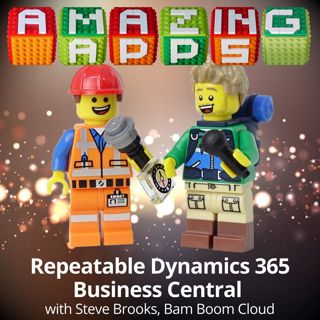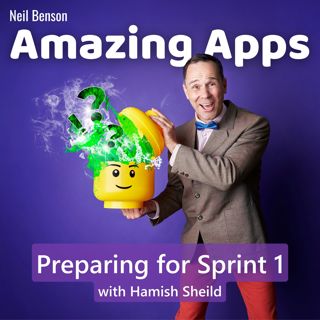
Preparing for the First Sprint: Design Thinking and Discovery with Hamish Sheild
#160. Hamish Sheild is a Microsoft MVP and Power Platform consultant specialising in applying Design Thinking practices to our apps and projects to make them more human-centred. Hamish and I discuss the different activities and artifacts we've experimented with before starting the delivery phase of our Power Platform and Dynamics 365 projects. Join us as we discuss:03:43 Design thinking exercises and goal setting08:45 Inclusion of developers in the discovery phase09:48 Importance of day in the life sessions11:59 Exploration of design sprints17:10 Creating customer and user journey maps18:48 Utilizing user story maps for clarity24:21 The role of prototyping in projects25:11 Developing solution blueprints with Dynamics 36530:18 Size and refinement of initial product backlog32:02 Establishing environments32:48 Business process maps35:35 Crafting stakeholder maps for project successHAMISH SHEILDHamish Sheild on LinkedInAppRisingDesigning Business Applications RESOURCESAvion for user story mappingStoriesOnBoard for user story mappingMiro for visual collaborationRECOMMENDED EPISODES130 Sprint 1 is Done!120 Defining Requirements for Complex Power Apps with Hamish Sheild👋 LET'S CONNECT🌐 Subscribe to Customery Academy newsletter for new episode announcements and special offers🟥 Subscribe on YouTube🟦 Follow on LinkedIn🟦 Neil Benson on LinkedIn🦋 Neil Benson on BlueSky⭐ RATE AND REVIEW THE SHOW👍 Rate Amazing Apps👨💻 MY ONLINE COURSES🚀 Agile Foundations for Microsoft Business Apps 🏉 Scrum for Microsoft Business Apps 📐 Estimating Business Apps
10 Mars 40min

Here's when to use a waterfall approach with Power Platform
#159. Should you use a traditional, waterfall approach to build Power Platform apps? In this episode, I break down six situations when you might be tempted to use a waterfall method and share my thoughts on whether that's really the best approach.Highlights00:11 Everyone should try waterfall at least once.02:18 When to adopt a waterfall approach02:53 #1 Predictable and well-defined requirements04:19 #2 Regulated industries05:49 #3 Fixed-price contracts06:59 #4 Small or simple projects08:02 #5 No agile experience08:59 #6 Lots of dependencies10:09 Recap `ResourcesEstimating Agile Business Apps: learn how to quickly, accurately and confidently estimate how long it'll take and how much it'll cost to build your Power Platform or Dynamics 365 app. Cynefin Model: learn how to approach different problems from simple to complex.Successful Scrum for Microsoft Business Apps: learn the Scrum framework, prepare for certification and discover my proven practices for successfully applying Scrum for Dynamics 365 and Power Platform.Team Topologies: Matthew Skelton discusses how different team topologies can reduce the impact of dependencies across an organisation.
7 Feb 11min

What is Scrum and why should Power Platform teams care?
#158. It's 2025, and I still meet Power Platform and Dynamics 365 professionals that don't know what Scrum is or have an incomplete understanding of what Scrum is. Especially in job interviews!In this short episode, you'll learn:What Scrum really isWhy it's a framework and not a methodologyA simple hack for remembering the 18 components of Scrum🚀 Agile Foundations for Microsoft Business Apps: Learn the basics and benefits about adopting agile approach to building business applications. https://customery.com/foundations
1 Jan 6min

Are Scrum Masters Overrated?
#157. Rethink the role of the scrum master. Two recent events—a thought-provoking article by agile coach Maarten Dalmijn and a leave of absence by Matthew, a beloved scrum master in my team—prompted me to question if scrum masters might be overrated.Comparing scrum teams to sports teams like Ultimate Frisbee, where players self-regulate without referees. Imagine a world where your scrum team operates the same way, holding each other accountable and mastering the game without a dedicated scrum master.You'll learn about Maarten's controversial stance: in startups and scale-ups with fewer organizational impediments, having a scrum master might be unnecessary overhead. Instead, Martin suggests that with a deep understanding of scrum, your team could self-manage effectively.I share my own team's bold experiment—replacing a traditional scrum master with a hybrid scrum master-developer. Spearheaded by Sapan, who has extensive experience in both development and scrum, this experiment offers surprising results. It's not a one-size-fits-all solution for all Power Platform teams. But it does highlight the importance of being open to new practices and continuous experimentation in agile development.Keep experimenting 🧪-NeilRESOURCESMaarten Dalmijn on LinkedInMaarten Dalmijn, 'Are Scrum Masters Too Much Overhead?'
2 Dec 20248min
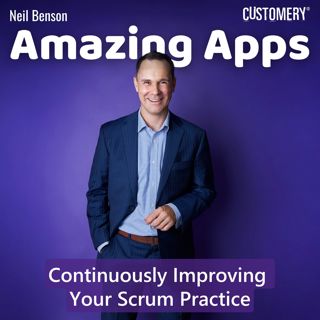
Improving Your Scrum Practice - Mastering Professional Scrum - chapter 1
#156. Drawing on the book "Mastering Professional Scrum" by Stephanie Ockerman and Simon Reindl, I outline critical areas for team success, such as creating valuable products and understanding organizational influences. I emphasize five core capabilities needed for continuous improvement: teaching, facilitation, coaching, technical excellence, and servant leadership.I discuss the continuous improvement process recommended by Ockerman and Reindl, which includes self-assessment questionnaires and root cause analysis to address team issues. I highlight the importance of the Scrum pillars—transparency, inspection, and adaptation—and shows how sprint events like planning and review foster a culture of empiricism, allowing teams to run experiments and refine their practices based on real-world outcomes.Celebrating the traits of high-performing scrum teams, I underscore the significance of being cross-functional, self-managing, and collaborative. I touch upon practices that bolster collaboration within these teams, such as backlog refinement and pair programming, while also stressing the freedom scrum teams have to define their workflows within Scrum guidelines.You'll also learn about common challenges, such as the absence of key roles during refinement sessions, and recommends using the Five Whys technique to tackle root causes. I provide practical tips like conducting multiple short refinement sessions to prevent release delays.RESOURCESSimon Reindl on LinkedInStephanie Ockerman on LinkedInMastering Professional Scrum from Amazon (affiliate)Mastering Professional Scrum audiobook on Audible (affiliate)Stephanie Ockerman's site, Agile SocksMastering Professional Scrum on InformIT
4 Aug 202432min
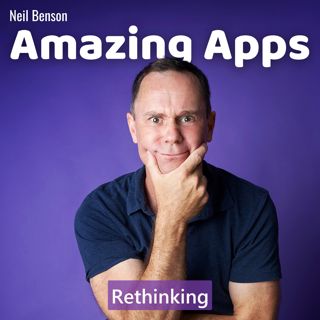
Do We Need to Rethink How We Build Power Platform and Dynamics 365 Apps?
#155. Explore the importance of rethinking our approach to building business applications. Discover the benefits of questioning our assumptions and adapting to new information in the dynamic landscape of app development.Unpacking the concept of "thinking like a scientist" and its impact on creating agile business apps.Understanding cognitive entrenchment and how it can hinder our progress in app development.Examining how embracing new tools like Power Automate or Azure Data Factory can outdo outdated practices.Learning from personal experiences and external experts to reassess long-held beliefs about health and productivity.Discovering how to stay open-minded to new methods for building Power Platform and Dynamics 365 apps without losing sight of effective agile approaches.Keep experimenting 🧪-NeilRESOURCESMicrosoft Power Platform Conference, 18 to 20 October 2024Peter Attia’s The Drive podcastOutlive by Peter AttiaPeter Attia’s websiteAdam Grant’s podcastsAdam Grant’s websiteSubscribe to my new Estimating Business Apps podcast mini-seriesEstimating Business Apps is a five-part podcast that will help you quickly, accurately and confidently estimate complex Power Platform and Dynamics 365 apps in minutes. Listen now: https://estimating-business-apps.captivate.fm/listen
14 Apr 20248min
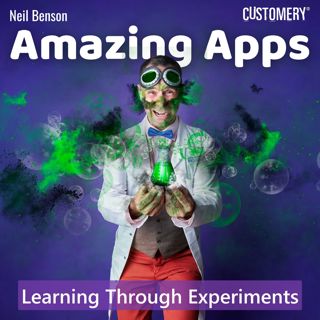
The Power of Learning Through Experiments in Power Apps Development
#154. Neil Benson takes us on a journey of learning through experimentation. Starting with the historical origins of smallpox inoculation, Neil discusses the importance of conducting experiments to drive innovation and problem-solving. Sharing personal experiences from his biochemistry studies to his current work in building applications with Power Platform and Dynamics 365, Neil emphasizes the value of agile software development and the significance of learning through short bursts of experimentation. He provides insights into real-world experiments with AI Builder and form processing models, highlighting the impact of these experiments on improving business processes. Neil also shares his experimentation with AI features in his own content creation and business operations, encouraging listeners to embrace the mindset of a scientist and continue experimenting. So, tune in to explore the power of learning through experiments and discover how it can accelerate your own journey in building amazing apps.Free Workshop: 3 Secrets to Building Business Apps with ScrumJoin this free interactive workshop to discover the three secrets to successfully using Scrum to build agile apps so you can deliver projects faster, under budget, have more fun, and get promoted.https://customery.com/3secretsMentioned in this episode:Subscribe to my new Estimating Business Apps podcast mini-seriesEstimating Business Apps is a five-part podcast that will help you quickly, accurately and confidently estimate complex Power Platform and Dynamics 365 apps in minutes. Listen now: https://estimating-business-apps.captivate.fm/listen
26 Feb 202413min

Should .NET Developers Stick or Switch to Power Platform?
#153. Keith Atherton is a proper pro developer. Keith shares his journey from developing custom apps using .NET, C# and SQL Server to embracing and mastering the development of enterprise business applications using the Power Platform.What do developers lose and gain using Power Platform compared to developing an app from scratch with .NET and SQL Server.The power of rapidly prototyping applications in Power Apps even compared to wireframing tools, like Basalmiq.How Keith decides when to use a low-code option or write code to meet a requirement.The value of documenting our own solutions and decisions, even if it's just for our own benefit later. Developers are used to unit testing, automated regression testing, AI-assisted programming. Do you miss those capabilities when working with Power Platform, especially Power Fx? How Keith thinks about keeping his skills up-to-date and mastering so many competencies through a weekly learning routine.Why .NET and C# developers should start with PL-900 Power Platform Fundamentals as their starting point for learning how to transfer their skills to Power Apps development.If Keith had a magic wand, Microsoft would enable him to use C# in the Power Fx editor.Keep experimenting 🧪-NeilKeith AthertonKeith Atherton on LinkedIn: https://www.linkedin.com/in/keith-atherton/Keith's blog: https://www.keithatherton.com/Keith's podcast, On Air in the Cloud: https://onairinthecloud.com/ResourcesKeith's courses on LinkedIn Learning: https://www.linkedin.com/learning/instructors/keith-atherton PL-900 Power Platform Fundamentals training on Microsoft Learn: https://learn.microsoft.com/en-us/training/paths/power-plat-fundamentals/Real-world examples of Power Platform solution architectures: https://learn.microsoft.com/en-us/power-platform/guidance/architecture/real-world-examples/overviewCONNECT🌏 Amazing Apps website🟦 Customery on LinkedIn🟦 Neil Benson on LinkedIn MY ONLINE COURSES🚀 Agile Foundations for Microsoft Business Apps 🏉 Scrum for Microsoft Business Apps 📐 Estimating Business Apps Mentioned in this episode:Subscribe to my new Estimating Business Apps podcast mini-seriesEstimating Business Apps is a five-part podcast that will help you quickly, accurately and confidently estimate complex Power Platform and Dynamics 365 apps in minutes. Listen now: https://estimating-business-apps.captivate.fm/listen
8 Jan 202429min
